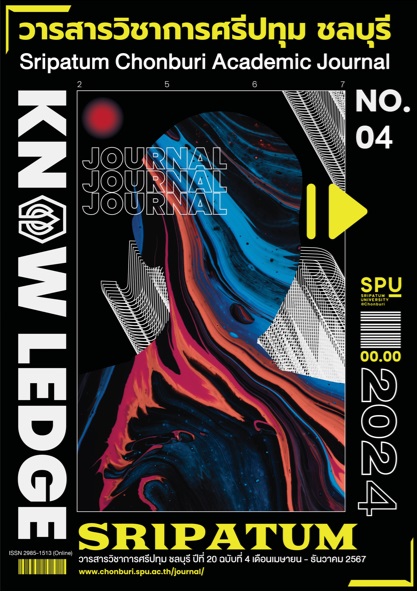AN ANALYSIS OF TOURIST OPINION TOWARDS MICHELIN-STARRED THAI RESTAURANTS: APPROACHES TO PROMOTE GASTRONOMY TOURISM
Keywords:
Thai Restaurants, Michelin Star, Gastronomy TourismAbstract
This research aimed to 1) analyze and categorize the opinions of foreign tourists on Michelin-starred Thai restaurants by distinguishing between positive and negative feedbacks and 2) examine these opinions in relation to the six dimensions of restaurant and dining service quality. The data were collected from 177 opinions on Trip Advisor which were reviewed by foreign tourists on the latest Michelin-starred Thai restaurants and then analyzed by content and descriptive analysis (percentage and frequency).
The findings revealed that 1) the top three positive aspects according to foreign tourists were the taste of the food, its presentation, and staff service. The top three negative aspects were taste that may not appeal to all or was inconsistent, subpar staff service, and high prices. 2) Regarding service quality dimensions, most comments (both positive and negative) were primarily related to trust in food taste, followed by such aspects as prompt service, staff politeness, friendliness, and attentiveness. This research could be utilized by government agencies and business operators to enhance the quality of restaurant services and promote Thailand's Gastronomy tourism.
References
เจริญชัย เอกมาไพศาล และบุษกร จุลบรรยงค์. (2562). ปัจจัยความสำเร็จของร้านอาหารไทยภายใต้รางวัลมิชลินสตาร์. วารสารศิลปศาสตร์มหาวิทยาลัยธรรมศาสตร์, 19(2), หน้า 53–82.
ปิยะวิทย์ ทิพรส และอัศวิน แสงพิกุล. (2565). การวิเคราะห์งานวิจัยและคําวิจารณ์ของลูกค้าในธุรกิจเชิงสุขภาพประเภทเดย์สปา. วารสารการบริหารและสังคมศาสตร์ปริทรรศน์, 5(3), หน้า 75-87.
ปรีชา ตั้งสุขขีย์ศิริ, ณภัทร สําราญราษฎร์ และหงสกุล เมสนุกูล. (2565). แนวทางส่งเสริมการท่องเที่ยวบนพื้นฐานของซอฟต์พาวเวอร์ด้านอาหารพื้นถิ่นจังหวัดสุโขทัย. วารสารวิทยาการจัดการมหาวิทยาลัยราชภัฏพิบูลสงคราม, 4(2), หน้า 32–44.
Namkung, Y., & Jang, S. C. (2008). Are highly satisfied restaurant customers really different? A quality perception perspective. International Journal of Contemporary Hospitality Management, 20(2), pp. 142–155.
Nye Joseph S., J. (2005). Soft Power: The Means to Success in World Politics. New York: Public Affairs Books.
Ramseook, P. (2012). Perceived Service Quality in Restaurant Services: Evidence from Mauritius. International Journal of Management and Marketing Research, 5(3), pp. 1–15.
Sangpikul, A. (2019). The analysis of customers’ e-complaints and service quality at spa services in Thailand. E-Review of Tourism Research, 6(6), pp. 45–62.
Shobeiri, S. (2014). Improving customer website involvement through experiential marketing. Service Industries Journal, 34(11), pp. 885-900.
Downloads
Published
Issue
Section
License
Copyright (c) 2024 Sripatum University Chonburi Campus

This work is licensed under a Creative Commons Attribution-NonCommercial-NoDerivatives 4.0 International License.
บทความทุกบทความเป็นลิขสิทธิ์ของวารสารวิชาการศรีปทุม ชลบุรี



